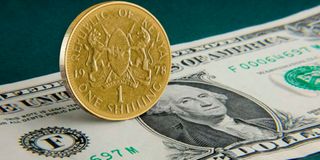
The Kenyan shilling and the US dollar.
The Kenya shilling this week touched an 8-month low of 129.80 against the dollar, driven by the economic effects of tariffs instituted by US President Donald Trump.
The shilling touched the 129.80 level against the dollar on Tuesday -- the lowest since August 5, 2024, when it stood at 130.10 against the greenback. The shilling, however, recouped marginal value against the dollar to settle at 129.79 at close trading Thursday.
Analysts tied the movement of the shilling to global economic dynamics in the face of tariff fights between the US and other top global economies.
“There has been considerable noise on the global front—particularly surrounding tariff policy. While the recent pause offers some breathing room, the continuation of a 10 percent flat tariff still carries consequences,” Standard Investment Bank Senior Research Associate Stellar Swakei said.
“From a trade perspective, this effectively erodes the value of our exports, which in turn weighs down the current account.”
Kenya, Ghana, Ethiopia, Tanzania, Uganda, Senegal and Liberia are among countries whose exports to the US will be subject to the baseline tariff of 10 per cent.
“A strong shilling position has no clear fundamentals currently. Consequently, we expect to see the scenario persist given the uncertainty of Trump tariffs, lack of commitment on restoration of USAID funding and expected continued monetary easing to instigate economic growth,” Odhiambo Ramogi of Elim Capital explained.
Shilling is 'constantly under pressure'
Some analysts, however, don’t see steep volatility of the shilling against the greenback.
“Being a net importer means the shilling is constantly under pressure as businesses have a strong demand for foreign exchange. That said, CBK has enough reserves to prevent significant volatility,” Ken Gichinga, Chief Economist at Mentoria Economics, said.
The usable foreign exchange reserves held at CBK stood at $9.8million (Sh1.26trillion), an equivalent of 4.4 months of import cover, as of April 10, 2025.
This extends a trend of high liquidity from the first quarter of the year when official foreign reserves held at the apex bank hit an all-time high of $10.1 billion (Sh1.3 trillion) on excess cash left on the table after investors snubbed Kenya’s $900million (Sh116.4billion) Eurobond buyback offer.
Some analysts said that the shilling has also ceded ground against the dollar because of the monetary easing programme by CBK, which might be viewed negatively in the foreign currency markets given persisting inflationary risks.
“The dollar index was on a general weakening trend. So if the shilling weakened against the dollar, it is very likely because we sold shillings and bought dollars,” Pius Nderi, an economic analyst, said.
“I expect to see growth in our official reserves as a consequence. I also expect to see a slight increase in inflation.”
In March, the monetary policy committee lowered the CBK indicative rate by 75 basis points to 10.00 percent from 10.75 percent. The MPC noted that overall inflation was expected to remain below the midpoint target range in the near term, supported by low core inflation, lower food inflation, stable energy prices inflation, and continued exchange rate stability.









